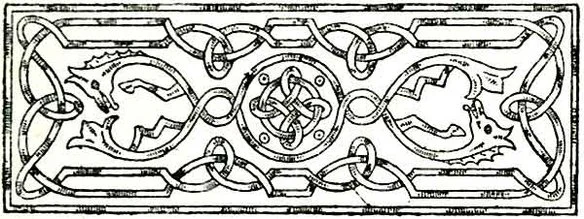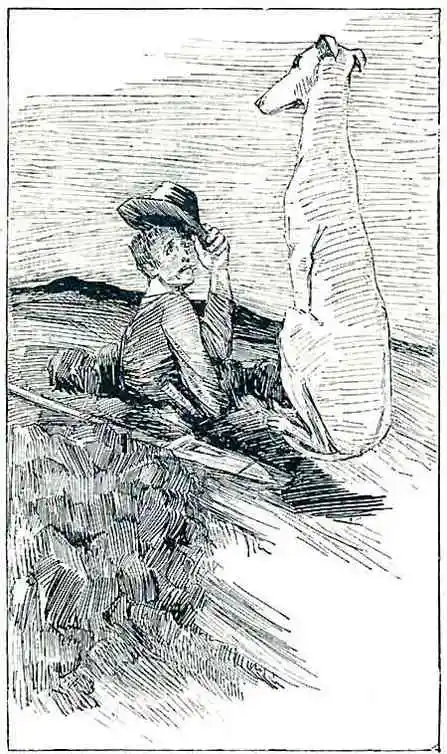Pratt: kiln-dried Quakers, butter-buying buckeens from Mallow Lane, and a drinking exciseman from the Coal Quay, to meet the great thundering artillery general that is come out of the Indies, and is the biggest dust of them all.'
'You scoundrel!' exclaimed the colonel, 'I'll make you show yourself'; and snatching up his sword from a corner of the room, he sprang out of the window upon the lawn. In a moment a shout of laughter, so hollow, so unlike any human sound, made him stop, as well as Mr. Bell, who with a huge oak stick was close at the colonel's heels; others of the party followed to the lawn, and the remainder rose and went to the windows. 'Come on, colonel,' said Mr. Bell; 'let us catch this impudent rascal.'
'Ho, ho! Mr. Bell, here I am—here's Teigue—why don't you catch him? Ho, ho! Colonel Pratt, what a pretty soldier you are to draw your sword upon poor Teigue, that never did anybody harm.'
'Let us see your face, you scoundrel,' said the colonel.
'Ho, ho, ho!—look at me—look at me: do you see the wind, Colonel Pratt? you'll see Teigue as soon; so go in and finish your dinner.'
'If you're upon the earth, I'll find you, you villain!' said the colonel, whilst the same unearthly shout of derision seemed to come from behind an angle of the building. 'He's round that corner,' said Mr. Bell, 'run, run.'
They followed the sound, which was continued at intervals along the garden wall, but could discover no human being; at last both stopped to draw breath, and in an instant, almost at their ears, sounded the shout—
'Ho, ho, ho! Colonel Pratt, do you see Teigue now? do you hear him? Ho, ho, ho! you're a fine colonel to follow the wind.'
'Not that way, Mr. Bell—not that way; come here,' said the colonel.
'Ho, ho, ho! what a fool you are; do you think Teigue is going to show himself to you in the field, there? But, colonel, follow me if you can: you a soldier! ho, ho, ho!' The colonel was enraged: he followed the voice over hedge and ditch, alternately laughed at and taunted by the unseen object of his pursuit (Mr. Bell, who was heavy, was soon thrown out); until at length, after being led a weary chase, he found himself at the top of the cliff, over that part of the river Lee, which, from its great depth, and the blackness of its water, has received the name of Hell-hole. Here, on the edge of the cliff, stood the colonel out of breath, and mopping his forehead with his handkerchief, while the voice, which seemed close at his feet, exclaimed, 'Now, Colonel Pratt, now, if you're a soldier, here's a leap for you! Now look at Teigue—why don't you look at him? Ho, ho, ho! Come along; you're warm, I'm sure, Colonel Pratt, so come in and cool yourself; Teigue is going to have a swim!' The voice seemed as if descending amongst the trailing ivy and brushwood which clothes this picturesque cliff nearly from top to bottom, yet it was impossible that any human being could have found footing. 'Now, colonel, have you courage to take the leap? Ho, ho, ho! what a pretty soldier you are. Good-bye; I'll see you again in ten minutes above, at the house—look at your watch, colonel: there's a dive for you'; and a heavy plunge into the water was heard. The colonel stood still, but no sound followed, and he walked slowly back to the house, not quite half a mile from the Crag.
'Well, did you see Teigue?' said his brother, whilst his nephews, scarcely able to smother their laughter, stood by.
'Give me some wine,' said the colonel. 'I never was led such a dance in my life; the fellow carried me all round and round till he brought me to the edge of the cliff, and then down he went into Hell-hole, telling me he'd be here in ten minutes; 'tis more than that now, but he's not come.'
'Ho, ho, ho! colonel, isn't he here? Teigue never told a lie in his life: but, Mr. Pratt, give me a drink and my dinner, and then good-night to you all, for I'm tired; and that's the colonel's doing.' A plate of food was ordered; it was placed by John, with fear and trembling, on the lawn under the window. Every one kept on the watch, and the plate remained undisturbed for some time.
'Ah! Mr. Pratt, will you starve poor Teigue? Make every one go away from the windows, and Master Henry out of the tree, and Master Richard off the garden wall.'
The eyes of the company were turned to the tree and the garden wall; the two boys' attention was occupied in getting down; the visitors were looking at them; and 'Ho, ho, ho!—good luck to you, Mr. Pratt! 'tis a good dinner, and there's the plate, ladies and gentlemen. Good-bye to you, colonel!—good-bye, Mr. Bell! good-bye to you all!' brought their attention back, when they saw the empty plate lying on the grass; and Teigue's voice was heard no more for that evening. Many visits were afterwards paid by Teigue; but never was he seen, nor was any discovery ever made of his person or character.

THE FAIRY GREYHOUND

addy M'Dermid was one of the most rollicking boys in the whole county of Kildare. Fair or pattern[3] wouldn't be held barring he was in the midst of it. He was in every place, like bad luck, and his poor little farm was seldom sowed in season; and where he expected barley, there grew nothing but weeds. Money became scarce in poor Paddy's pocket; and the cow went after the pig, until nearly all he had was gone. Lucky however for him, if he had gomch (sense) enough to mind it, he had a most beautiful dream one night as he lay tossicated (drunk) in the Rath[4] of Monogue, because he wasn't able to come home. He dreamt that, under the place where he lay, a pot of money was buried since long before the memory of man. Paddy kept the dream to himself until the next night, when, taking a spade and pickaxe, with a bottle of holy water, he went to the Rath, and, having made a circle round the place, commenced diggin' sure enough, for the bare life and sowl of him thinkin' that he was made up for ever and ever. He had sunk about twice the depth of his knees, when whack the pickaxe struck against a flag, and at the same time Paddy heard something breathe quite near him. He looked up, and just fornent him there sat on his haunches a comely-looking greyhound.
 "FORNENT HIM THERE SAT ON HIS HAUNCHES A COMELY-LOOKING GREYHOUND."
"FORNENT HIM THERE SAT ON HIS HAUNCHES A COMELY-LOOKING GREYHOUND."
'God save you,' said Paddy, every hair in his head standing up as straight as a sally twig.
'Save you kindly,' answered the greyhound—leaving out God, the beast, bekase he was the divil.
1 comment